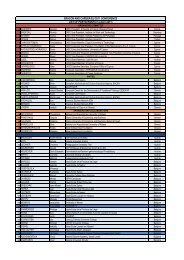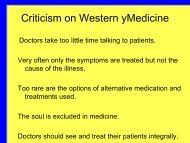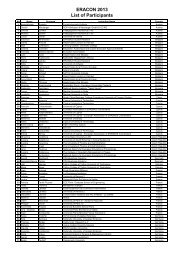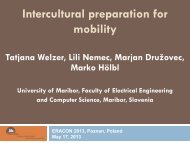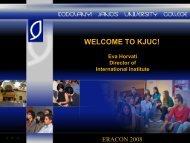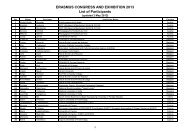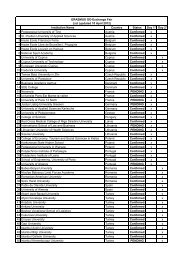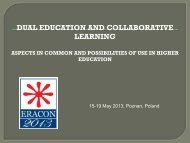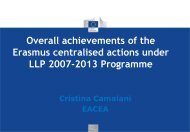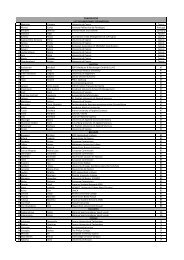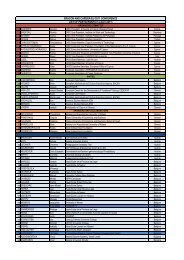erasmus mobility and career: the contribution of ... - Eracon.info
erasmus mobility and career: the contribution of ... - Eracon.info
erasmus mobility and career: the contribution of ... - Eracon.info
You also want an ePaper? Increase the reach of your titles
YUMPU automatically turns print PDFs into web optimized ePapers that Google loves.
ERASMUS MOBILITY AND CAREER: THE<br />
CONTRIBUTION OF ERASMUS PROGRAMME TO<br />
CAREERS OF GRADUATE PARTICIPANTS<br />
H<strong>and</strong>e GÜREŞEN<br />
Gazi University, Ankara, Turkey<br />
atah<strong>and</strong>e@gmail.com<br />
ABSTRACT<br />
Erasmus Programme has been very popular <strong>and</strong> inspiring among <strong>the</strong><br />
undergraduate students <strong>of</strong> higher education institutions in recent years. The<br />
programme brings a different perspective to all <strong>of</strong> <strong>the</strong> Erasmus students. It is seen<br />
as a valuable experience both academically <strong>and</strong> culturally. Thus, <strong>the</strong> advantages <strong>of</strong><br />
participating in any <strong>mobility</strong> <strong>of</strong> Erasmus Programme for <strong>the</strong> student are <strong>of</strong> course<br />
not open to any discussion while s/he is studying. On <strong>the</strong> o<strong>the</strong>r h<strong>and</strong>, after <strong>the</strong><br />
student graduates, <strong>the</strong> advantages <strong>of</strong> being a former Erasmus student from his/her<br />
point <strong>of</strong> view are a matter <strong>of</strong> discussion. The <strong>contribution</strong> <strong>of</strong> Erasmus Student<br />
Mobility for Studies or for Placement through <strong>the</strong> <strong>career</strong> <strong>of</strong> <strong>the</strong> participant varies<br />
according to <strong>the</strong> pr<strong>of</strong>ession <strong>of</strong> <strong>the</strong> participant. This study is conducted with a group<br />
<strong>of</strong> graduate students <strong>of</strong> Gazi University who participated in Erasmus Student<br />
Mobility for Studies or for Placement while <strong>the</strong>y were studying. They are given a<br />
questionnaire which has questions evaluating <strong>the</strong>ir opinions about <strong>the</strong> relation<br />
between Erasmus Mobility <strong>and</strong> <strong>the</strong>ir <strong>career</strong>. The answers <strong>of</strong> <strong>the</strong>se questions are<br />
evaluated <strong>and</strong> <strong>the</strong> results are commented considering <strong>the</strong> kind <strong>of</strong> <strong>mobility</strong> <strong>and</strong> <strong>the</strong><br />
different pr<strong>of</strong>essions <strong>of</strong> <strong>the</strong> participants aiming to stimulate future participation <strong>of</strong><br />
Erasmus students.<br />
INTRODUCTION<br />
Gazi University’s first academic unit, a school to raise teachers for <strong>the</strong><br />
newly founded Republic <strong>of</strong> Turkey was established in 1926 by <strong>the</strong> leadership <strong>of</strong><br />
Atatürk. Year after year, several academic units were founded <strong>and</strong> in 1982, it<br />
became Gazi University as we know today. Gazi University has 21 faculties, 11<br />
vocational schools, 4 schools, 1 conservatory, 7 graduate schools <strong>and</strong> 48 research<br />
centres. In short, first, second <strong>and</strong> third cycles, approximately 80.000 students are<br />
studying at Gazi University which has various fields <strong>of</strong> study <strong>and</strong> faculties such as<br />
Dentistry, Pharmacy, Industrial Arts Education, Humanities, Natural Sciences,<br />
Education, Fine Arts, Law, Economics <strong>and</strong> Administrative Sciences,
Communication, Engineering, Architecture, Health Sciences, Design, Technology,<br />
Medicine, Tourism <strong>and</strong> Commerce <strong>and</strong> Tourism Education.<br />
Since 2004, Gazi University has been carrying out <strong>the</strong> Erasmus<br />
Programme. International Relations Office coordinates <strong>the</strong> <strong>mobility</strong> <strong>of</strong> students <strong>and</strong><br />
staff.<br />
This study is conducted with a group <strong>of</strong> graduate students <strong>of</strong> Gazi<br />
University who participated in Erasmus Programme. The students answered a<br />
questionnaire which has questions evaluating <strong>the</strong>ir opinions about <strong>the</strong> relation<br />
between Erasmus Mobility <strong>and</strong> <strong>the</strong>ir <strong>career</strong>. The questionnaire was sent to over 100<br />
students via e-mail. 18 students answered <strong>the</strong> e-mail <strong>and</strong> <strong>the</strong> questions. 10 <strong>of</strong> <strong>the</strong>m<br />
had participated in placement <strong>mobility</strong> <strong>and</strong> 8 <strong>of</strong> <strong>the</strong>m participated in <strong>the</strong> <strong>mobility</strong><br />
for studies before <strong>the</strong>y graduated.<br />
THE QUESTIONNAIRE<br />
The idea <strong>of</strong> being an Erasmus student <strong>and</strong> living <strong>the</strong> experience must be<br />
promoted among university students. Thus, it is significant to underst<strong>and</strong> <strong>the</strong><br />
<strong>contribution</strong> <strong>of</strong> <strong>the</strong> programme to <strong>career</strong>s <strong>of</strong> participants <strong>and</strong> encourage prospective<br />
students referring to <strong>the</strong> experiences <strong>of</strong> former students:<br />
“Mobile students are considered superior to non-mobile students<br />
almost consistently with regard to foreign language pr<strong>of</strong>iciency,<br />
intercultural underst<strong>and</strong>ing <strong>and</strong> knowledge <strong>of</strong> o<strong>the</strong>r countries, i.e.<br />
areas directly linked to international experience.” (Bracht, Engel,<br />
Janson, Over, Schomburg <strong>and</strong> Teichler, 2006)<br />
The questionnaire (Table 1) was prepared in order to underst<strong>and</strong> <strong>the</strong> effect<br />
<strong>of</strong> Erasmus Mobility on <strong>the</strong> ideas <strong>of</strong> <strong>the</strong> participants about <strong>the</strong>ir <strong>career</strong>s. It has two<br />
parts. In part 1, <strong>the</strong> participants fill <strong>the</strong> questionnaire form with <strong>the</strong>ir personal,<br />
academic <strong>and</strong> pr<strong>of</strong>essional <strong>info</strong>rmation. In part 2, <strong>the</strong>y answered <strong>the</strong> questions<br />
about <strong>the</strong>ir <strong>mobility</strong> <strong>and</strong> <strong>the</strong>ir expectations about it.
Table 1<br />
A Research about <strong>the</strong> Contribution <strong>of</strong> Erasmus Programme to Careers <strong>of</strong><br />
Graduate Participants<br />
Part 1<br />
• Contact Information<br />
• Faculty <strong>and</strong> department you graduated from<br />
• Current institution/corporation/firm you work at<br />
• Your position at work <strong>and</strong> a brief job definition<br />
• When did you participate in your Erasmus <strong>mobility</strong> (Which academic<br />
year)<br />
• Which <strong>mobility</strong> Study or Placement<br />
• Which country <strong>and</strong> university did you go to<br />
Part 2<br />
1. Before your <strong>mobility</strong>, did you think that Erasmus would contribute to your<br />
<strong>career</strong> after graduation If your answer is yes, what did you expect from <strong>the</strong><br />
programme<br />
2. After your <strong>mobility</strong> ended, while you were continuing your studies at Gazi<br />
University, did <strong>the</strong>se expectations change<br />
3. After graduation, while you were looking for a job, did you think that Erasmus<br />
would contribute to this process<br />
4. While preparing your CV, did you state on <strong>the</strong> CV that you were an Erasmus<br />
Student<br />
5. At your job interviews, did you mention that you were an Erasmus student If<br />
yes, did <strong>the</strong> interviewer make a comment about it Did you think that <strong>the</strong><br />
interviewer have a positive impression about you<br />
6. How long after graduation, did you start your first job<br />
7. After starting your job, did being a former Erasmus participant contribute for<br />
you practically Please mention briefly.
INTERPRETATION<br />
Below, <strong>the</strong> answers <strong>of</strong> <strong>the</strong> participants to <strong>the</strong> questions are stated in <strong>the</strong>ir<br />
own words. All participants had expectations from Erasmus about <strong>the</strong>ir <strong>career</strong>s.<br />
Participants stated on <strong>the</strong>ir resumes that <strong>the</strong>y were Erasmus students. A study<br />
period in ano<strong>the</strong>r country makes <strong>the</strong> job seeker’s CV distinct. (Teichler, Janson,<br />
2007) The participants mentioned about Erasmus at <strong>the</strong>ir job interviews <strong>and</strong><br />
received positive reactions. Almost all participants regard Erasmus Programme<br />
useful for <strong>the</strong>ir <strong>career</strong>.<br />
Question 1<br />
Before your <strong>mobility</strong>, did you think that Erasmus would contribute to your <strong>career</strong><br />
after graduation If your answer is yes, what did you expect from <strong>the</strong> programme<br />
• “Yes”<br />
• “Language practice”<br />
• “Social <strong>and</strong> intercultural interaction”<br />
• “Experience in a foreign country might be useful”<br />
• “A broader vision”<br />
• “Contribution to personality contributes to <strong>career</strong>”<br />
• “Education at a foreign university will be useful”<br />
• “No”<br />
• “Pro<strong>of</strong> <strong>of</strong> foreign language pr<strong>of</strong>iciency”<br />
• “To be able to work at international companies / institutions”<br />
• “Research in a different country”<br />
• “To find a good job”<br />
• “A plus in <strong>the</strong> resume”<br />
• “Self-confidence”<br />
• “Creates a priority while job selection process”<br />
• “Scientific environment”<br />
• “Suitable job at import & export departments <strong>of</strong> companies”<br />
• “To see a different business discipline, a different perspective will be an<br />
advantage throughout <strong>the</strong> <strong>career</strong>”<br />
Question 2<br />
After your <strong>mobility</strong> ended, while you were continuing your studies at Gazi<br />
University, did <strong>the</strong>se expectations change<br />
• “Yes”<br />
• “The <strong>mobility</strong> will fulfil my expectations in future”
• “Realised that I must improve my foreign language”<br />
• “No”<br />
• “Seen more advantages <strong>of</strong> <strong>the</strong> <strong>mobility</strong> when came back”<br />
• “A broader perspective, expected much more from my <strong>career</strong>”<br />
• “The <strong>mobility</strong> has fulfilled all <strong>of</strong> my expectations”<br />
• “Absolutely disappointing – not contributed to my pr<strong>of</strong>essional <strong>career</strong> at<br />
all”<br />
Question 3<br />
After graduation, while you were looking for a job, did you think that Erasmus<br />
would contribute to this process<br />
• “Yes<br />
• “No”<br />
• “Opportunity to work abroad”<br />
• “Might be useful at private corporations/companies”<br />
• “An impressive quality in <strong>the</strong> eyes <strong>of</strong> employers”<br />
• “To pursue a <strong>career</strong> abroad”<br />
• “It will look good on my CV”<br />
• “Not a practical use, only good on <strong>the</strong> CV”<br />
• “More expectations day after day”<br />
• “Not sure”<br />
• “No one questions my English when I say I was an Erasmus student”<br />
• “Cannot be a plus at <strong>the</strong> business sector I would like to work”<br />
Question 4<br />
While preparing your CV, did you state on <strong>the</strong> CV that you were an Erasmus<br />
Student<br />
• “Yes”<br />
• “Absolutely”<br />
• “Yes, although it has been many years, I still state that I was an Erasmus<br />
student <strong>and</strong> this makes <strong>the</strong>m interested.”<br />
• “Especially emphasize this”<br />
• “No”<br />
• “Mentioned about <strong>the</strong> university I went to, but not about Erasmus”<br />
Question 5<br />
At your job interviews, did you mention that you were an Erasmus student If yes,<br />
did <strong>the</strong> interviewer make a comment about it Did you think that <strong>the</strong> interviewer<br />
have a positive impression about you
• “Yes”<br />
• “Appreciated by academicians, but regarded by ordinary people as “a<br />
vacation”<br />
• “Positive impression while being interviewed, expressed by gestures <strong>and</strong><br />
body language”<br />
• “Employers see Erasmus as a valuable experience”<br />
• “Positive comments by interviewers, talked about my <strong>mobility</strong> in detail”<br />
• “Have no idea about <strong>the</strong>ir impression”<br />
• “They preferred me because <strong>of</strong> my Erasmus experience”<br />
• “Talked about it in detail, this subject turned <strong>the</strong> serious conversation into<br />
a casual chat. I was became less nervous thanks to that, <strong>the</strong>y found me selfconfident<br />
in foreign language skills”<br />
Question 6<br />
How long after graduation, did you start your first job<br />
• “Before graduation”<br />
• “4 months”<br />
• “2 months”<br />
• “Right after graduation”<br />
• “3 months”<br />
• “6 months”<br />
• “One year”<br />
• “Don’t have a job”<br />
Question 7<br />
After starting your job, did being a former Erasmus participant contribute to you<br />
practically Please mention briefly.<br />
• “Methods <strong>and</strong> experiences learned abroad may help me”<br />
• “Absolutely”<br />
• “Useful as I work in cooperation with international companies<br />
• “International projects”<br />
• “Has not contributed to me yet”<br />
• “This experience made me a more outgoing person”<br />
• “Scientific <strong>contribution</strong>”<br />
• “English language practice”<br />
• “Intercultural social relations / become more communicative”<br />
• “No”<br />
• “I no longer say “I know English but I cannot speak”
There are not many differences between <strong>the</strong> answers <strong>of</strong> participants <strong>of</strong><br />
Placement <strong>and</strong> Studies. It cannot be said that more participants to placement<br />
<strong>mobility</strong> regard Erasmus as contributing than <strong>the</strong> participants to studies <strong>mobility</strong> or<br />
vice versa. There is not such a difference.<br />
The participants <strong>of</strong> <strong>the</strong> questionnaire pursue various <strong>career</strong>s <strong>and</strong> have<br />
different pr<strong>of</strong>essions.<br />
The pr<strong>of</strong>essions <strong>of</strong> <strong>the</strong> participants <strong>of</strong> <strong>mobility</strong> for studies are:<br />
- Research Assistant<br />
- Unemployed<br />
- English Teacher<br />
- Project Coordinator<br />
- S<strong>of</strong>tware Engineer<br />
- Constructor Engineer<br />
- Director at a company<br />
- Architect<br />
And <strong>the</strong> pr<strong>of</strong>essions <strong>of</strong> placement <strong>mobility</strong> are:<br />
- Lecturer at a university<br />
- Biologist (2 people)<br />
- Officer at a state institution (2 people)<br />
- Research Assistant<br />
- Researcher at an institution<br />
- Doctor<br />
- Unemployed (2 people)<br />
Participants who have academic <strong>career</strong>s or who work as scientists think <strong>of</strong><br />
<strong>the</strong>ir Erasmus experience as a scientific <strong>contribution</strong> to <strong>the</strong>ir <strong>career</strong>s. On <strong>the</strong> o<strong>the</strong>r<br />
h<strong>and</strong>, participants who have jobs at international companies have benefited from<br />
Erasmus in a more practical sense.<br />
The participants also consider <strong>the</strong> programme useful when it comes to<br />
develop foreign language skills:<br />
“As was to be expected, former ERASMUS students <strong>and</strong> o<strong>the</strong>r<br />
internationally mobile students felt 3 times as strong in foreign<br />
language pr<strong>of</strong>iciency than did formerly non-mobile students. They<br />
were also convinced that temporary study in ano<strong>the</strong>r country was<br />
helpful in getting to know <strong>the</strong> culture <strong>and</strong> society <strong>of</strong> <strong>the</strong> host<br />
country <strong>and</strong> in underst<strong>and</strong>ing o<strong>the</strong>r cultures <strong>and</strong> getting along with<br />
persons from different cultural backgrounds. O<strong>the</strong>rwise, <strong>the</strong>y<br />
hardly reported a different pr<strong>of</strong>ile <strong>of</strong> competences than did<br />
formerly non-mobile students. They only viewed <strong>the</strong>mselves<br />
moderately stronger as far as working independently, adaptability,
<strong>and</strong> general communication skills are concerned.” (Teichler, Janson,<br />
2007)<br />
According to <strong>the</strong> participants, Erasmus is such an experience that one can<br />
develop his/her social relations at a community. In this way, <strong>the</strong> development <strong>of</strong><br />
interpersonal relations <strong>and</strong> communication skills effect pr<strong>of</strong>essional relations<br />
positively.<br />
CONCLUSION<br />
The study indicates that graduate Erasmus students <strong>of</strong> Gazi University find<br />
<strong>the</strong> programme significantly effective on <strong>the</strong>ir <strong>career</strong> paths. According to <strong>the</strong><br />
results <strong>of</strong> <strong>the</strong> questionnaire, it can be said that Erasmus contributes to social,<br />
interpersonal, communicational, pr<strong>of</strong>essional <strong>and</strong> foreign language skills.<br />
Every aspect <strong>of</strong> <strong>the</strong> Erasmus programme must be promoted among higher<br />
education institutions so that more students may benefit from its valuable qualities.<br />
ACKNOWLEDGEMENT<br />
I would like to present my acknowledgement to my colleagues, Ekin<br />
AKGEZER <strong>and</strong> Aslı EKEN, <strong>and</strong> to <strong>the</strong> Erasmus Institutional Coordinator <strong>of</strong> Gazi<br />
University, Assoc. Pr<strong>of</strong>. Ufuk KOCA ÇALIŞKAN for <strong>the</strong>ir support <strong>and</strong><br />
<strong>contribution</strong>.<br />
REFERENCES<br />
Maiworm, Friedhelm; Teichler, Ulrich, Study Abroad <strong>and</strong> Early Career:<br />
Experiences <strong>of</strong> Former ERASMUS Students. Higher Education Policy Series<br />
35. ERASMUS Monograph No. 21, Jessica Kingsley Publishers, 1996<br />
Teichler, Ulrich; Janson, Kerstin, The Pr<strong>of</strong>essional Value <strong>of</strong> Temporary Study<br />
in Ano<strong>the</strong>r European Country: Employment <strong>and</strong> Work <strong>of</strong> Former ERASMUS<br />
Students, 11: 486, Sage, 2007<br />
Bracht, Oliver; Engel, Constanze; Janson, Kerstin; Over, Albert; Schomburg,<br />
Harald; Teichler, Ulrich, The Pr<strong>of</strong>essional Value <strong>of</strong> ERASMUS Mobility,<br />
International Centre for Higher Education Research (INCHER-Kassel) University<br />
<strong>of</strong> Kassel, Kassel, Germany, 2006




